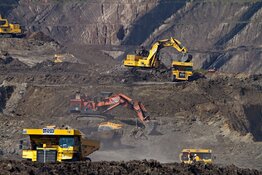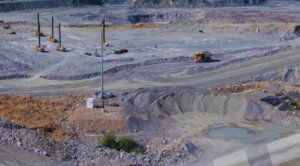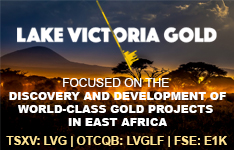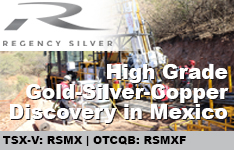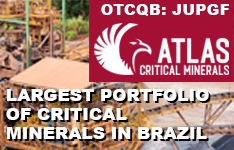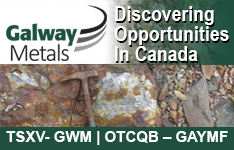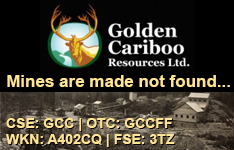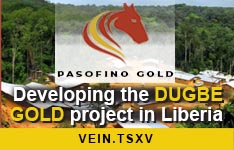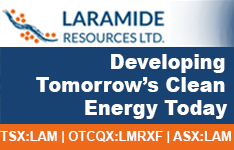The Gold Report: Why should investors pay attention to Cambodia?
Ken Booth: Because of political forces, Cambodia was forgotten and ignored. The French explored during its colonial period in Vietnam and other parts of Southeast Asia. That information was lost. The Australians explored Southeast Asia, but focused more on Indonesia, closer to its backyard. The political strife that ended in the mid-1980s further stopped foreign investment in Cambodia and it became a forgotten place.
While things were quiet in Cambodia, the past 20 years have seen significant exploration and development in Vietnam, Laos and Thailand. As a result, Laos has a world-class copper mine and a producing gold mine. Those countries share many geological similarities to Cambodia. For now, there isn't a big database of exploration results for Cambodia. But the country should be on people's maps for mining exploration. And it is beginning to be.
TGR: What types of deposits are explorers searching for? Gold? Copper?
KB: From a commercially viable point of view, the targets are copper, copper/gold systems and epithermal precious metal systems. That is true of the east and central areas of the country. In the western regions on the border with Thailand, small-scale miners have been extracting precious and semi-precious stones for decades.
TGR: So what's the situation with regard to exploration in Cambodia right now? Is it a greenfield?
KB: It would be considered greenfields, but some initial work has been done. Some geological maps are available. Initial exploration is not too difficult—it's fairly easy to get around. We're not talking about difficult physiography. First-stage exploration can be done rapidly through stream-sediment sampling and geophysics. Modern exploration would be considered greenfield.
Interestingly, on the eastern border with Vietnam, there has been significant small-scale and artisanal mining over the past 10 years. That activity does not appear to be historical and seems to be on the decline. Many of the miners cross the border illegally; it is a fairly porous border. The miners mine the alluvial material down to hard rock.
TGR: In those areas, do companies follow the small-scale miners to the most prospective areas?
KB: Yes. There are many forces at work in this situation. The border is tightening up. A lot of those small miners don't use the best environmental mining practices and many use mercury. The Cambodian government is in the process of removing many of these people off the properties, pushing them back into Vietnam. The good news is the miners have exposed veins at surface, or they've excavated pits and you can get to hard rock or regolith. Clearly, they are extracting gold out of the alluvium and out of the veins, so the miners are also benefiting while doing the prep work for the modern explorers.
TGR: Does this put the mining companies and the government in the path of conflict with the local population?
KB: The Cambodian government is encouraging economic development on all fronts. It looks around the world and sees how mining has benefited a lot of countries. The government is making positive moves toward resource development. With mineral resources, the government is proactive in making sure that illegal miners—especially the ones who have crossed over the border—are moved off the land. That places the government in a good position to work with companies. If a company has a memorandum of understanding with the government on a particular piece of ground, the government will support the company in its endeavors. In those cases, the government will resolve the issues with illegal mining. Most of the small-scale mining is alluvial, which is very different from the mining exploration that public companies are engaged in.
TGR: In the past, you have discussed Angkor Gold Corp. (ANK:TSX.V). What is new there?
KB: Angkor Gold is one of the most active companies in Cambodia. The other significant company is Renaissance Minerals Ltd. (RNS:ASX) from Australia, which recently purchased a 750,000 ounce (750 Koz) gold deposit from OZ Minerals Ltd. (OZL:ASX) Those are the companies that are the most proactive explorers in Cambodia. I've heard that there are Chinese-backed private entities working within the country, but I don't have any knowledge as to who they are or what they're looking for. Angkor Gold's main focus is exploration for gold, copper and copper-gold systems while Renaissance Minerals' main focus is developing its 750 Koz gold resource.
TGR: Angkor Gold is an early-stage exploration company. With so many projects, how do you value the company?
KB: Angkor Gold has a lot of projects. The beauty about going into a country like Cambodia at this stage of the game is you get to be the first mover. The best company to bet on is the first mover that gets in and acquires the most prospective land. Angkor Gold has used its in-country managers, who have had experience in Cambodia over the last decade, to claim or apply for large tracts of land in order to ensure that it is the first mover. Over time, as exploration companies explore their land packages, less prospective areas will be dropped. While Angkor Gold looks as if it has a lot of land, and it does, it's only from the point of view of saying, "I've got six or seven areas here I really think are prospective, I want to make sure I have those." And as it works those properties, hopefully it will be successful on one or more. But, that land position will change dynamically over time.
TGR: What would be the timeline to get a resource estimate in this situation?
KB: Faster than you might think. Cambodia has four drilling companies and three assay labs. I believe two of those assay labs are accredited for reporting under the Australian reporting system as well as under Canadian NI 43-101 policies. Drillers and labs are busy, but they exist. The large labor force is not a problem; people are available and ready to work. Infrastructure is good and improving.
Getting to a resource is no worse than in a first-tier mining jurisdiction like the U.S., Canada, Mexico or Peru. In fact, you could be slightly ahead just by virtue of not having to compete for labor and potentially less bureaucratic red tape than in more developed countries. If a company is looking at a small vein-style deposit, it can probably develop the resource in fairly short time. If it is trying to drill off a resource in a large copper-porphyry system, that will take a lot longer, just by virtue of it being a much larger target.
TGR: Many sources state that Cambodia has a stable legal and regulatory framework. The mining law was written about 10 years ago, so it is still young. Can you comment?
KB: The legal system was developed with external advisers to ensure that it could be used by foreigners who wanted to invest within the country to protect property and individual rights. For a country that has a fairly new legal system, it appears to be good. The same applies to the mining law.
In creating legal systems, many developing countries rely on the expertise of people and legal systems from other jurisdictions. It seems to work well. It is an open system with clear rules spelled out in the memorandum of understanding. Companies can apply for small acreage or large acreage. But either way, exactly how to make the application and then what companies have to do to keep their tenure are well defined. It is an open and transparent legal system and mining law.
TGR: What are your thoughts on how an investor should participate in Cambodia?
KB: Investors should align themselves with managers that understand resource development in emerging jurisdictions. Investors need to realize that if they are in early, they have the potential for outsized rewards—if they pick the right managers. Early investment in a country like Cambodia needs to be managed by people who understand the initial foray into the country by companies like Angkor Gold, Oz Minerals and now Renaissance Minerals. Those initial prospects may generate gains when sold to developers.
In all these countries, people have their views on where they've come from and how bad the situation was. But the most important thing is to understand where they are today. Resource investors who get in early should do well. But they need an appetite for risk.
I consider Cambodia to be in its infancy, and it has not been explored to any great degree. There are similar stories of ignored countries in Africa including Somalia, Sierra Leone and the Democratic Republic of the Congo. We've got an example close by in Colombia. Fifteen years ago, exploring for gold in the Colombian jungle would have been considered crazy. Now Colombia is a major destination for exploration.
TGR: At this point, do you have an idea of what fraction of Cambodia has been explored?
KB: Oh, I would put it down to less than 5%.
TGR: There's a lot of room for exploration still.
KB: A lot of room for exploration. Here is how I think it will play out. Somewhere, there will be a success or a discovery. You will see additional modern techniques applied on a large scale countrywide. How much has been explored? Well, a relatively small percentage, because it's all being done using tried-and-true methods—feet on the ground, mapping and sampling. When larger surveys, such as airborne geophysics, start to highlight prospective areas, things could really open up.
TGR: What thoughts would you like to leave with the readers?
KB: If investors are looking for a company that's early stage and prospective, they should look at Angkor Gold. If investors are looking for a country that is early stage and prospective, they should look at Cambodia. It is a mining-friendly jurisdiction. Investment is coming to the country and infrastructure is improving. As an investor or a company, the "first mover" gets the pick of the litter. And I think Angkor Gold has definitely done a good job on that. Investors should pay attention to both Cambodia and Angkor Gold.
TGR: Thanks for taking the time to talk to us.
Ken Booth has more than 30 years of experience in exploration, mining corporate finance and public company administration. In mining corporate finance, he has worked for two of Canada's largest investment banks executing numerous equity financings for both junior and senior companies and was involved in a variety of significant mergers and acquisitions. While working for resource companies, Booth has held several positions including CEO and vice president of corporate development. He is currently providing financial advice to the junior mining sector and is a director of four exploration companies.
Want to read more exclusive Gold Report interviews like this? Sign up for our free e-newsletter, and you'll learn when new articles have been published. To see a list of recent interviews with industry analysts and commentators, visit our Exclusive Interviews page.
Disclosure:
1) Alec Gimurtu of The Gold Report conducted this interview. He personally and/or his family own shares of the following companies mentioned in this interview: None.
2) The following companies mentioned in the interview are sponsors of The Gold Report: Angkor Gold Corp. Streetwise Reports does not accept stock in exchange for services. Interviews are edited for clarity.
3) Ken Booth: I personally and/or my family own shares of the following companies mentioned in this interview: Angkor Gold Corp. I personally and/or my family am paid by the following companies mentioned in this interview: None. I was not paid by Streetwise Reports for participating in this story.



